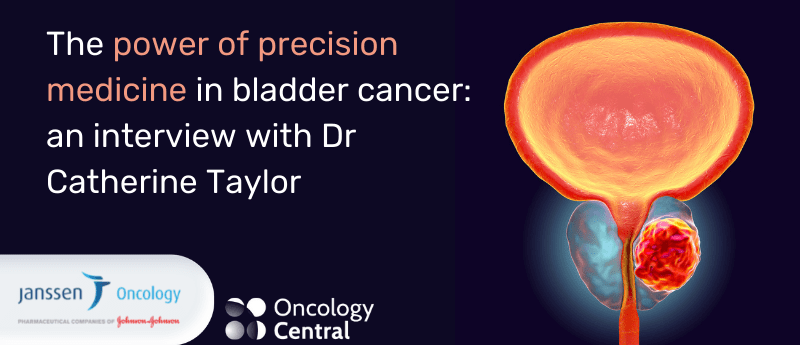The power of precision medicine in bladder cancer: an interview with Dr Catherine Taylor

Tell us a bit about your experience, current role and what initially attracted you to your job.
I joined my role as Vice President of Europe, the Middle East and Africa Medical Affairs, Therapy Area Strategy at Janssen (Beerse, Belgium) as the company always stood out to me as being truly passionate about changing the face of cancer care and management, putting patients first and making a meaningful impact in the areas where there is the greatest unmet need. Being oncology trained, I have had the privilege of supporting patients both clinically as part of my role, and also work to develop new treatment approaches.
What motivated you to work in oncology?
My main motivation has always been to help make cancer a less devastating disease. Today, it is the second leading cause of death globally – there were an estimated 10 million deaths from cancer in 2020 [1,2]. It is particularly prevalent in Europe, which represents 9.7% of the global population yet has the second highest incidence of cancer, accounting for 22.8% of all new cancer cases and 19.6% of cancer related deaths [3]. A quarter of deaths are caused by cancer in the EU [4].
What advancements have Janssen made towards making cancer a less devastating disease?
At Janssen, our main aim is to break new ground in the areas where there is the greatest unmet need. Our work is underpinned by a desire to change what it means for patients to receive a cancer diagnosis and we seek to achieve this by pushing for constant progress.
Our entire portfolio has the potential to support the 1.1 million patients in Europe diagnosed with bladder, lung and prostate cancers, in 2020 [5]. We are building towards a strong legacy in solid tumors, and we seek to achieve targeted, transformative solutions in areas such as bladder cancer.
Which areas of oncology research do you think have the potential to transform outcomes for patients?
The recent advancement in precision oncology is an area that I personally find very exciting. These developments have the power to transform how oncology is practiced and provide new treatment opportunities for cancer patients. The great promise of precision oncology is to treat cancer patients using a personalized approach that is tailored to their unique genetic composition, lifestyle and environment [6].
We are the first to target FGFR in bladder cancer and similarly in lung cancer with EGFR exon 20 insertion mutations [7,8]. Furthermore, our research into cancer interception may one day allow for cancer to be diagnosed before it can fully develop – which would be a remarkable breakthrough.
Which cancers do you feel would benefit the most from innovative new solutions?
Of course, all cancer types urgently need new solutions, but bladder cancer has often been overlooked, with a low priority for research funding [9]. People living with bladder cancer often face a poor prognosis, with a 5% survival rate over 5 years in the metastatic setting [10]. This needs to change, and it is a challenge the scientific community can collectively overcome.
What progress is being made at Janssen towards making a meaningful change for patients suffering from bladder cancer?
With the Power of Purpose and through Janssen’s ongoing research in precision oncology, we are gaining a better understanding of the FGFR pathway. Janssen are investing in innovative new technology that helps deliver medication straight to tumors located in the bladder [TARIS] [11–13]. In parallel, we work closely with patient advocacy groups and health professionals across Europe to ensure the patient perspective is embedded as early as possible in the development of our medicines.
Precision medicine in bladder cancer has the potential to not only eliminate cancer, but to change what a cancer diagnosis means, giving back time and quality of life to people living with the disease [6]. I believe this can really be achieved through the right product, for the right patient, at the right time.
The opinions expressed in this interview are those of the author and do not necessarily reflect the views of Oncology Central or Future Science Group.
Find out more by visiting Janssen EMEA here:
References:
- World Health Organization. International Agency for Research on Cancer. GCO. Available at: www.gco.iarc.fr/today/online-analysis-pie
- World Health Organization. Health Topics – Cancer. Available at: www.who.int/health-topics/cancer#tab=tab_1
- Sung H, Ferlay J, Siegel RL et al. Global cancer statistics 2020: GLOBOCAN estimates of incidence and mortality worldwide for 36 cancers in 185 countries. CA Cancer J. Clin. 1–41 (2021).
- Eurostat. 1 in 4 deaths in the EU are due to cancer. Available at: www.ec.europa.eu/eurostat/web/products-eurostat-news/-/DDN-20181122-1
- World Health Organization. International Agency for Research on Cancer. Available at: www.gco.iarc.fr/today/data/factsheets/populations/908-europe-fact-sheets.pdf
- The Pharmaceutical Journal. The precision medicine approach to cancer therapy: part 1 — solid tumours. Available at: www.pharmaceutical-journal.com/article/research/the-precision-medicine-approach-to-cancer-therapy-part-1-solid-tumours
- BioSpace. FDA Approves Janssen’s Balversa, First Targeted Therapy for Metastatic Urothelial Carcinoma. Available at: www.biospace.com/article/fda-approves-janssen-s-balversa-first-targeted-therapy-for-metastatic-urothelial-carcinoma/
- Remon, J, Hendriks LEL, Cardona AF & Besse B. EGFR exon 20 insertions in advanced non-small cell lung cancer: A new history begins. Cancer Treatment Rev. 90 (2020).
- Action Bladder Cancer UK. The Facts About Bladder Cancer. Available at: www.actionbladdercanceruk.org/the-facts-about-bladder-cancer/
- Kamaneh Montazeri & Joaquim Bellmunt. Erdafitinib for the treatment of metastatic bladder cancer. Expert Rev. Clin. Pharmacol. 13(1), 1–6 (2020).
- Grimberg DC, Shah A & Inman BA. Overview of Taris GemRIS, a Novel Drug Delivery System for Bladder Cancer. Eur. Urol. Focus. 6(4), 620–622 (2020).
- ClinicalTrials.gov. A Study of TAR-200 in Combination With Cetrelimab, TAR-200 Alone, or Cetrelimab Alone in Participants With Non-Muscle Invasive Bladder Cancer (NMIBC) Unresponsive to Intravesical Bacillus Calmette-Guerin Who Are Ineligible for or Elected Not to Undergo Radical Cystectomy. Available at: www.clinicaltrials.gov/ct2/show/NCT04640623
- ClinicalTrials.gov. A Study of TAR-200 in Combination With Cetrelimab Versus Concurrent Chemoradiotherapy in Participants With Muscle-invasive Bladder Cancer (MIBC) of the Bladder. Available at: www.clinicaltrials.gov/ct2/show/NCT04658862





